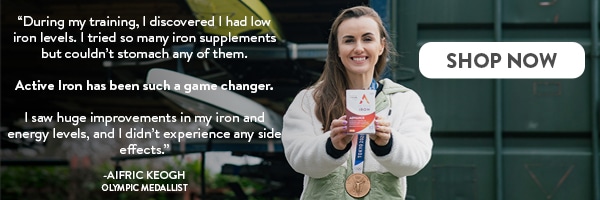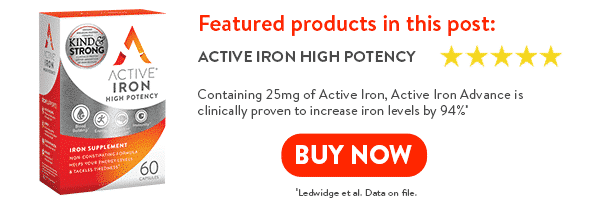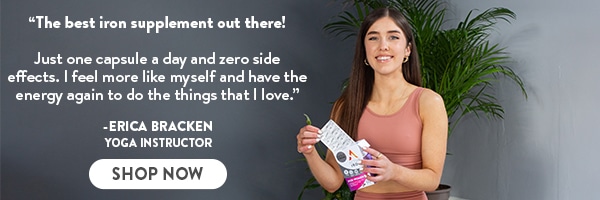Iron supplements for athletes: how it can help performance.

- Iron Supplements for Blood Donors
- Do Iron Supplements Cause Constipation?
- Oral Iron Supplements: A Complete Guide from Active Iron
- Iron Supplements For Athletes
- The best iron supplements to take for sensitive stomachs
- The best iron supplements for vegetarians
- Best Iron Supplement for Sensitive Stomach in America
- Benefits Of Iron For Your Immune System
- How to take iron supplements for best absorption?
- What does iron saturation mean?
- What is the function of iron in our bodies?
- When to take iron supplements morning or night?
- Iron supplement side effects
- How much iron per day for a woman
Iron is essential to life, but not many people know about its benefits for athletes. Unfortunately, I only came to understand its importance in the later years of my professional career.
Ensuring iron levels are at the right level can have a huge impact on an athletes performance and stamina.
Understanding of the impact the menstrual cycle has on female athletes is still in its infancy, yet more and more women are starting to realize that there are methods to support a woman’s menstrual cycle, that can help continuation of athletic training and performance throughout the month.
Iron is an integral part of this. I was always tired and struggling daily with fatigue, but understanding more about the role iron plays in energy production has turned my tiredness and fatigue around.
That’s why in this article, I want to discuss key topics and answer frequently asked questions such as:
- How iron supports our body
- Who is at risk of low iron?
- Daily intake requirements
- Athletic performance and Iron
- The best supplements for athletic performance
- Iron rich food
- Low iron foods
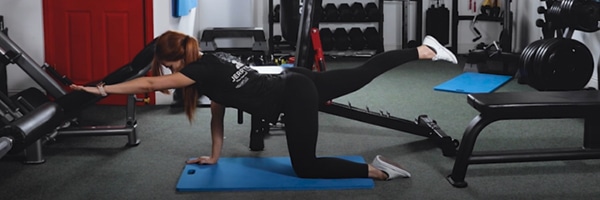
How iron supports our body
Iron is a key mineral that the body needs to support haemoglobin formation and the creation of red blood cells. Iron carries oxygen around the body, to our muscles and brain, making it essential for both mental and physical performance.
Because of this, low iron levels may result in feelings of tiredness, fatigue, and reduced stamina.
Iron also helps support our cognitive function, which includes memory, problem solving, and our concentration levels.
It also helps support our immune systems, the body’s natural defense system.
Who is at risk of low iron?
Globally, there are 2.1 billion people living with low iron.¹
Low iron is common in athletes. In fact, it is estimated that up to 50% of females who exercise have low iron levels.²
While females are at higher risk of low iron due to monthly loss of blood with menstruation, male athletes can also suffer from it.
Every athlete is different, so iron levels and iron requirements may vary depending on a person’s physiology and training schedule.
I would recommend keeping on top of your iron levels via regular blood testing (ensure you get both your hemoglobin and ferritin levels tested). This will also demonstrate if you may require an iron supplement, such as Active Iron.
Active Iron is clinically proven to increase iron levels by 94% in 6 weeks whilst helping to avoid the common side effects, offering a good solution to correct inadequate iron levels.

Daily iron intake requirements
Having the correct amount of iron depends on several factors such as gender, age, lifestyle and diet.
- Men over the age of 18 need 8.7mg of iron a day.
- Women of childbearing age, between 19-50, need 14.8mg of iron a day.
- During pregnancy, the need for iron increases to 30mg a day.
- Menopausal women aged over 50 need 8.7mg of iron a day.
I take Active Iron 25mg daily in the mornings with breakfast. I find it best to stick to a routine when taking iron to ensure there are no missed days.
Athletic performance and iron
Iron supports athletic performance in so many ways.
Firstly it can help increase your energy levels to maximise your training outputs.
Another area that we don’t talk enough about is our periods. When we are menstruating, we lose blood! This in turn leads to iron loss and low iron levels, which not only affects us during our period but also the days after your period has ended.
As a result, you may feel ongoing tiredness and fatigue. I also suffered injuries during my menstrual cycle which may be down to lack of focus and tiredness, caused by my low iron status.
The best iron supplements for athletic performance
As an athlete it is so important to be confident in what supplements you are taking. Active Iron is one of the best supplements to support every day function for a woman. It’s important that you take quality products that are well absorbed.
Active Iron is the best iron supplement for an athlete because it has 2X better absorption compared to other iron supplements.
Active Iron High Potency provides 25mg of iron in just one tablet and is clinically proven to increase iron levels by 94% in 6 weeks.
In the past I’ve used other iron supplements which have caused gut irritation – which then outweighs the benefits of taking iron as it massively affects your performance both in competition and training, I also wasn’t able to take it for a long period of time or if at all.
When I started taking Active Iron I was worried the same thing would happen, but because they are so well absorbed, they are less irritating to the gut. This means they help avoid common side effects like nausea and constipation. Since I started taking Active Iron I have never had any stomach upset.
Iron-rich foods
There are two types of iron which come from food sources: heme and non-heme.
Heme iron is the easiest for our bodies to absorb and is found in food such as red meat and fish.
Non-heme iron comes from plant-based sources including: rice, oats, nuts, beans, leafy greens and fortified cereals and breads. However, non-heme iron is more difficult for the body to absorb, and so while a plant-based diet may provide ample non-heme iron, an individual may still find themselves experiencing low iron levels.
Heme iron sources:
- Kidneys
- Liver
- Red meat (beef, lamb etc.)
- Fish (tuna, haddock)
Non-heme sources:
- Legumes
- Nuts
- Leafy green vegetables (broccoli, spinach etc.)
- Fruit
- Whole Grains & fortified cereals
- Coconut Milk
- Dark Chocolate
It is important to note that while a healthy balanced diet is very important, it can be difficult to get sufficient iron, especially if you are training hard.
Iron supplements such as Active Iron offer a great solution to those who want to ensure they are getting the right amount of iron for their body’s needs.
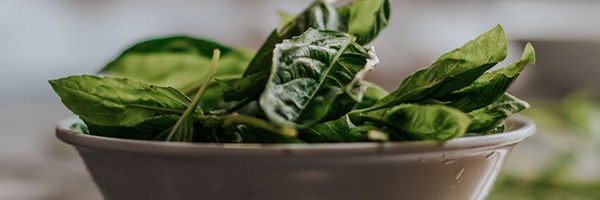
Foods low in iron
Many foods contain iron but certain foods contain little iron, these include chicken, turkey, cod, mackerel and salmon. Many foods also inhibit the absorption of iron, these include eggs, dairy products (such as milk and cheese), coffee, tea, wholegrains, seeds, beans, and some nuts.
¹Lopez et al. Iron Deficiency Anaemia, Lancet 2016; 387: 907–16
²Petkus DL, Murray-Kolb LE, De Souza MJ. Sports Med. 2017 Sep;47(9):1721-1737

